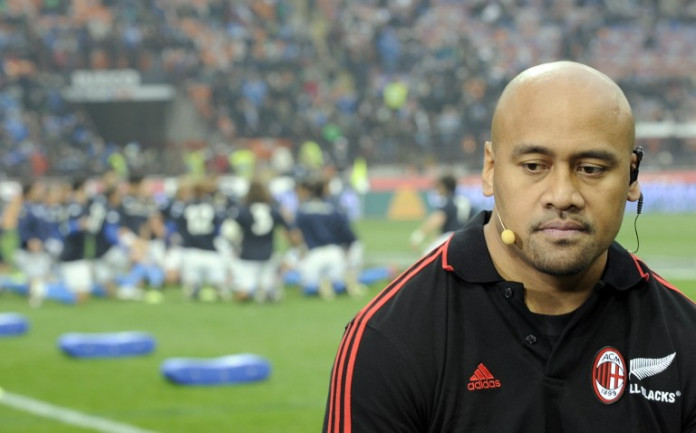After the highs of the a very successful World Cup, rugby fans worldwide were brought crashing down to earth with a thud at the news that rugby legend Jonah Lomu had died. I, myself was distraught with anguish given that the big man played a huge part in shaping my ambitions as a ruggerite at an early age. I still remember that 1995 RWC semifinal against England like it was yesterday. Lomu ran in four tries, one of them included running over a hapless Mike Catt in the last line of defense. I distinctly remember, in those days, everyone wanted to be him when playing at school, in the park, or back yard. That propelled him, the youngest ever All Black, into rugby super stardom. It is widely accepted that the human wrecking ball played a huge part in attracting commercial interests to the sport that was at the time on the verge of going professional.
A fact lost on many is that it was not the first time the All Blacks picked a ‘big’ ball carrier on the wing. There was bloke by the name of Va’aiga Tuigamala, of Samoan origin who also occupied the left wing in the early 90’s for a while despite being built in the mold of a front row forward. However, no one player has quite ever had the impact that Lomu did, on and off the rugby pitch. He was back at 1999 edition of the RWC where he continued to torment England, also, running amok against France, be it in a losing cause. What makes Jonah’s stupendous achievements all the more significant is that through it all, from the moment he donned the famous black jersey, he had to contend with the debilitating neuphrotic disease. This meant that at best he was able to perform at no more than 80% of his true potential. Imagine what a Jonah Lomu devoid of illness would have done?
In a cruel world, it’s some compensation in the form of poetic justice that Bryan Habana failed to eclipse the All Black legend’s record haul of RWC tries. Though they both rest on a tally of fifteen, the fact that Jonah amassed them in only two RWC’s (as opposed to Habana’s three appearances), will always stand out, unlikely to be surpassed.
It was amidst this cloud of gloom that the Dialog club rugby championship got underway last weekend. I missed the opening days play where the fancied Police team went down to Havies – a surprise result given the composition of the Police team. Rich investment has seen the Police rugby squad for this 2015 / 2016 season likened to Real Madrid of the football world, comprising of a host of rich talent. Many see this side as one that will arguably pose the biggest threat to the high riding Kandy outfit.
Funds, or should I say, the lack of it was the main talking point within the walls of the SLRFU, prior to the commencement of the tournament. Rather ironically it were the teams from the forces, namely Army SC, Police SC, and Air Force SC that had been in favour of bringing down foreign players to bolster their ranks, while the all the other more traditional clubs had voted against the motion. A stark contrast to how things were a decade or so ago.
The omission of foreigners for this season’s competition was duly passed with a majority being against. Digging deeper into the matter it transpires that most clubs are still reeling having invested heavily on overseas players last season. Thus, they simply do not have the means having to resolve their credit issues first.
From my earliest days, I remember club rugby to be all about these massive larger-than-life Fijians and Samoans turning out for their respective clubs. The likes of Jale Salu Salu of Havies. Apisi Nagata, and Manasa Qoro from the early CH & FC days. The collisions were enormous, and the rugby grounds in that day were converted to a virtual Coliseum, with gladiators battling it out on the field with crowds going wild all around. Sadly, this year, the rugby watching public will not have any of this, akin to being reduced to watching their favourite soap opera without any lead actors. We are told that should the tide turn regarding the financial situation within the clubs, that this stance will be revisited. I do not recommend that you hold your breath.
This brings us to an interesting question. Do foreign players really uplift the standards of local rugby?
I was at the CR vs Army SC game on Saturday. It was not pretty viewing. To be fair, we have all been pampered with some elite skill that was on show at the recently concluded RWC. Hence maintaining a balanced view is almost impossible. The reality is that we are light years behind that level of competition.
Let’s look at some of the pros of allowing foreign players. You should look no further than the wonders it has done for Japanese rugby. Many talented players from New Zealand, South Africa, and Australia have chosen to ply their trade in Japan in recent years. This has provided the local players with a fantastic opportunity to pick their brains and learn the finer aspects of the game. Frequent, top level completion does a lot for the progress of a rugby nation. We have seen this with Argentina, and we have now seen this with the Brave Blossoms. Who in their wildest dreams would ever have thought that Japan would ever beat the Springboks? It has to be said though, having someone as experienced as Eddie Jones, and a foreign coaching staff also had a great deal to do with it.
Speaking from a local context, the Carlton Sevens series that took place in recent years went a long way in uplifting the standards of our sevens rugby. Playing side by side with a host of global superstars did no end of good for the confidence of our local talent. I believe the good results we have seen on the ‘Sevens’ circuit are partly attributed to this.
However, in the fifteen man code, the dynamics are a bit different. The biggest issue the National team had was finding high quality centres and a number eight – the reason being that these positions at club level were almost certainly filled by a foreigner. This really hurt our aspirations I believe, though I felt a long term plan should have been put in place to secure at least a couple of foreign born players to be eligible for the national team on residency grounds. Who doesn’t do that nowadays? Japan, Hong Kong, UAE, even nations like England, and Scotland.
As a Sri Lankan rugby fan, I would very much like to see some top class talent on show. Players whom our boys can pick things off. Perhaps we should open the door to limitless Asian players such as from Japan, and South Korea? World rugby is moving forwards, with Japan 2019 set to blitz the game all Asia wide. Unfortunately, seems our local set-up is not quite in step with the rest.
A perfect example of the danger of not curtailing foreign influence is the Top 14 French league. France have been in steady decline in recent years and were completely upended at the hands of the All Blacks in that quarter final thrashing. The reasoning had a familiar twist to it. All the vital positions at the leading clubs were held by non-French nationals. Look at Toulon for example – a galactic force of international stars. But what has that done for their national side? Les Bleus is a team in compete disarray, providing a perfect example of the dangers that persist with the infusion of imports.














